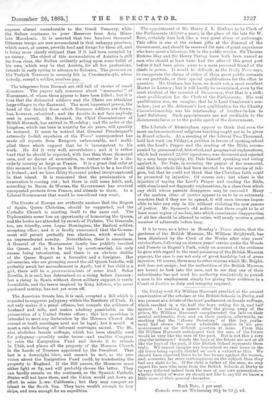On Friday week Sir William Harcourt presided at the annual
examination of the scholars at the British Schools in Derby, and was present at a debate of the boys' parliament on female suffrage, which resulted in a tie, half the boys voting for it, and half against. In making a speech after the giving away of the prizes, Sir William Harcourt complimented the lads on their mental arithmetic, first, and on their caution, afterwards, re. marking that the "Home Secretary" of this boy parlia- ment had shown the most admirable caution in his pro. nonncement on the difficult question at issue. From this Sir William Harcourt anticipated that the men of the future would be very like the men of the past. But is not this a very singular inference ? Surely the boys of the future are not at all like the boys of the past, if this British School represents them truly. We cannot imagine any boy-school we ever knew in the old times being equally divided on such a subject as this. We should have expected them to be five to one against the women, and, moreover, far more contemptuous on the subject than they had any right to be. If the child is father of the man, we may expect the men who issue from the British Schools at Derby to be very different indeed from the men of our own generation,— whether better of worse we should not like to say till we know a little more of their general character.


































 Previous page
Previous page